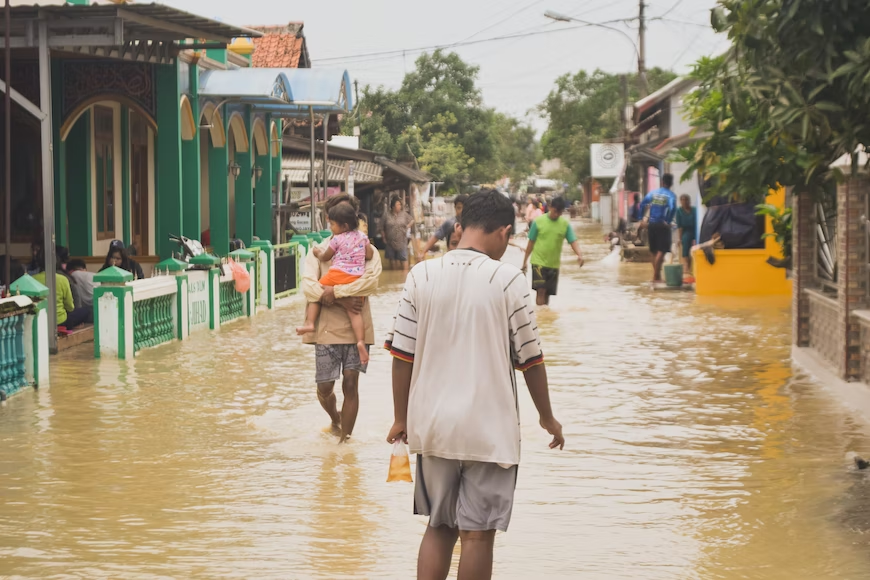· 4 min read
As Florida reels from the projected $60 billion losses and hundreds of deaths caused by Hurricane Ian – the costliest and one of the deadliest in the state’s history — it is worth remembering this represents less than 1% of the United States’ GDP.
In comparison, the recent catastrophic floods in Pakistan have not only resulted in thousands of deaths, but have left behind damages exceeding 15% of its GDP – roughly $40 billion in full.
Moreover, this disaster has devastated Pakistan’s largest employment sector – agriculture – which will cause reverberations throughout livelihoods, health, and economic opportunities, for years to come.
The scales of climate loss and damage are heavily weighted against the most vulnerable low-emitting economies, with an ever-growing disparity between the proportionate cost of climate change to high- versus low-income countries.
In the interests of climate justice, this year’s COP27 negotiations must settle the accounts and end the inequity of leaving those least responsible for climate change to pay the highest price.
For instance, studies show that the hand of climate change in Pakistan’s floods is undeniable, yet Pakistan has barely contributed to the current climate crisis – emitting just 0.5% of global greenhouse gas emissions between 1850 and 2020.
Elsewhere, African countries are estimated to lose up to 15% of their GDP annually due to the impact of climate change, despite historically contributing less than 3% of global emissions.
And small island nations, whose emissions contributions are negligible, are nonetheless facing an existential threat as the worsening climate crisis and rising sea level is destroying their lands, livelihoods, and culture.
High-income countries, and China, which are responsible for more than 80% of excess global carbon emissions, have the finances, resources, and responsibility to reverse this trend.
Yet, despite the push-back from several high-income countries, leaders must realize that failing to make these amends means the world’s most vulnerable nations will remain trapped in a perpetual cycle of constant climate-magnified disasters and recovery, unable to keep pace with global progress or even afford to meet their own climate goals.
That’s why climate negotiators at COP27 must fundamentally agree on funding for loss and damage.
Loss and damage finance has already been highlighted as a critical measure of success for the summit, and by supporting this funding, high-income countries can also demonstrate their commitments to human rights, climate justice, and social equity.
Denmark’s move to become the first country to pay for climate-related loss and damage is a model that should be replicated across other wealthy nations. As a first mover, Danish delegates should seize the chance at COP27 to make the case for others to join their mission to balance the climate books.
To have a chance of coping with future climate disasters and extremes, low-income countries face annual adaptation costs of up to $330 billion by 2030. Yet these costs will never be met if countries are perpetually picking up the bill of the last ruinous climate disaster.
Secondly, instead of rebranding or siphoning funds from existing, underfunded climate mitigation and adaptation mechanisms, new mechanisms need to be developed which allow polluting countries to compensate climate vulnerable countries directly and effectively.
For example, a new loss and damage fund needs to be created that allows immediate access to capital following disasters which exceed a certain threshold – for instance, when losses exceed 5% of the country’s GDP.
Finally, countries must also act to re-work existing climate finance and insurance systems, which have too often failed low-income countries most exposed to climate damages.
Insurance has been proposed as an alternative to loss and damage funding by some high-income countries but is not a substitute for direct compensation.
Any insurance mechanism developed specifically for addressing the loss and damage incurred by climate change must fundamentally be designed to benefit the insured, and not the wealthy insurer.
This year has shown – yet again – that loss and damage due to climate change is no longer a hypothetical scenario anywhere in the world, but is a lived reality for millions.
Although nations agreed at Paris in 2015 to limit global temperature rises to well below 2 degrees Celsius and pledged $100 billion in climate mitigation and adaptation every year for developing nations, these commitments have yet to be fulfilled.
And without proper climate compensation, there can be no true climate justice.
Ultimately, talk alone is cheap, and the world’s most developed and high-emitting economies must now prove the worth of their words at COP27 through funding for loss and damage, and meeting their existing pledges on mitigation and adaptation.
They have a responsibility and a duty to end this injustice by ensuring low- and middle-income countries can recover quickly, building greater resilience for future disasters.
After all, it is a false economy to allow the most vulnerable, low-income countries to continue picking up the climate tab.
This article is also published by Context. Illuminem Voices is a democratic space presenting the thoughts and opinions of leading Sustainability & Energy writers, their opinions do not necessarily represent those of illuminem.






